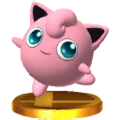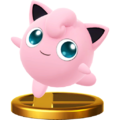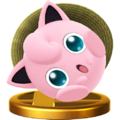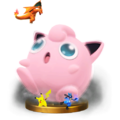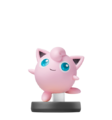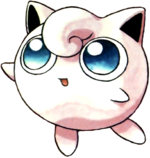Jigglypuff (SSB4)
| Jigglypuff in Super Smash Bros. 4 | |
|---|---|
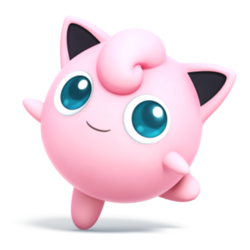 
| |
| Universe | Pokémon |
| Other playable appearances | in SSB in Melee in Brawl |
| Availability | Unlockable (3DS) Starter (Wii U) |
| Final Smash | Puff Up |
Jigglypuff (プリン, Purin) is a playable character in Super Smash Bros. 4. It was formally added to the official website on November 5th, 2014, though the launch of the 3DS version in Japan two months prior meant that it was already known to be in the game. It was also seen several times during the Super Smash Bros. for Wii U: 50-Fact Extravaganza.
Jigglypuff is once again voiced by Rachael Lillis (English) and Mika Kanai (Japanese) with the same voice clips from earlier installments. As in previous games, it also has different voice actresses in French and German due to name changes.
How to unlock
Complete one of the following:
- Collect 30 different equipment items.
- Play 120 VS Matches.
Jigglypuff must then be defeated on Unova Pokémon League.
Jigglypuff does not need to be unlocked in the Wii U version.
Attributes
Jigglypuff is a character of the extremes. It has the second highest air speed, one of the highest air acceleration values, the lowest falling speed and gravity, but also the slowest walking speed, the second slowest dashing speed, and is the lightest character in the game. These traits enforce a focus on aerial combat, as while Jigglypuff's ground attacks are not particularly weak, it cannot easily put itself in a position to use them. Meanwhile, in the air, Jigglypuff can make liberal use of aerial attacks and air dodges while weaving in and out of the opponent's reach.
With its short reach and lack of a projectile, approaching is difficult for Jigglypuff. In particular, it has a hard time getting past shields without the aid of Pound, as its slow dashing and falling speeds keep it from using its grab offensively. Its only approaching attack, the dash attack, is not safe enough to use, despite its high priority and power. To gain the upper hand in a fight, Jigglypuff must use its aerial mobility to space carefully and wait for an opening.
Once it does get through the opponent's defense, Jigglypuff can begin using its effective aerials to rack up damage and hopefully carry the opponent offstage. Jigglypuff is a veritable edgeguarder; even a foe with low damage and a good recovery risks being carried to the blast line by a chain of forward aerials. Jigglypuff can also block recovery attempts with its long-lasting neutral aerial or aim for a deadly blow with its powerful back aerial, also its most reliable onstage KO move.
Opponents who keep their feet on the ground are not necessarily safe from dying early against Jigglypuff. A single unwise or predictable move is all Jigglypuff needs to see before it can swoop in and unleash Rest, a swift and extremely powerful attack. If it should miss, however, Jigglypuff is left open for so long that it will almost certainly suffer a major punish (like a fully charged smash attack), often meaning death for such a frail character. Effective use of Rest requires both quick wits and courage, and whether a single attempt succeeds or fails will often decide the outcome of the match.
As effective as Jigglypuff's offstage game may be, however, it has one significant flaw - Jigglypuff has no vertical recovery move. Thus, although it can easily drift back to safety if launched diagonally, it is reliant on its midair jumps and Pound to gain height, and should it find itself below the stage with no jumps remaining, it can only fall slowly to its doom. This makes it susceptible to being gimped by meteor smashes and even footstool jumps, especially if an edgeguarding attempt should go awry. Even disregarding this possibility, Jigglypuff's very light weight gives it a short life expectancy in general, and it even dies instantly if its shield is broken, though its aerial prowess means it doesn't need to rely on its shield. One thing Jigglypuff does have going for it defensively is that it is difficult to combo; its combination of small size, light weight and slow falling speed allows it to escape followups that would be guaranteed against any other fighter, as well as slip out of multi-hit attacks with relative ease. Still, this does not make up for its fragility.
Jigglypuff also has many other flaws. While its aerial moveset is one of the best in the game, its grounded moveset is below average at best, having many grounded moves with notable startup and ending lag, and most of them having limited utility. Its special moves outside of Rest and Pound are of little use; Rollout is a highly telegraphed attack that can be easily interrupted with a stronger move or simply avoided, and while it can be used in midair to recover, hitting an opponent offstage will result in Jigglypuff falling below the blast line. Sing is also an underwhelming move, as while it can put the opponent to sleep to give Jigglypuff a free shot with powerful attacks (most notably Rest), it is easy to avoid due to its low range, long intervals between hitboxes and inability to affect aerial opponents, and its long duration makes it easily punishable. Jigglypuff also has poor custom moves, including Wakie Wakie and Spinphony, though some do have their uses (most notably Relentless Rollout and Pound Blitz, which improve its already good recovery). Its grab game is lacking, as its grab has low range and although its throws are among the most damaging in the game, they have limited utility. Jigglypuff lacks a reliable combo throw, and its KO throw has very low knockback scaling (requiring the use of platforms to KO at reasonable percentages).
Overall, Jigglypuff is a high-risk, high-reward character, capable of ending matches in a flash yet prone to losing just as quickly. Perhaps due to being overly reliant on punishing opponents' mistakes, it does not see much representation in tournaments and has not achieved notable results in singles. It does however fare somewhat better in team battles, to which its abilities are well-suited.
Changes from Brawl
Jigglypuff has received a mix of buffs and nerfs in the transition from Brawl to SSB4, both directly and indirectly. Jigglypuff benefits from the removal of hitstun cancelling, as it is now able to perform true combos with its aerials again. Additionally, its back aerial has been buffed to KO at realistic percentages at the cost of losing most of its speed. Also, its dash attack is now able to block weak attacks, giving it a new approach tactic and more tools to deal with projectiles. Finally, Jigglypuff's Rest has regained some of the power that it lost in Brawl, scales well with Rage, and is much easier to land due to the aforementioned removal of hitstun cancelling.
However, Jigglypuff's ground attacks and recovery were nerfed, and it can no longer perform two aerials in a single short hop. Furthermore, it still has among the worst range in the game. All of its smash attacks deal less damage, its forward air deals less knockback and damage, its down air has more startup and deals less damage, Rollout deals much less damage and knockback, and Sing can now be countered by opponents. While the changes to hitstun allow Jigglypuff to string together aerials more efficiently to edgeguard, it has a harder time edgeguarding overall due to the improved recoveries of the rest of the cast and the removal of edgehogging, as well Pound giving it noticeably less momentum for recovering. Lastly, the fact shields no longer take reduced damage and have higher shieldstun worsens its already poor defense.
Overall, Jigglypuff has not been significantly improved from its appearance in Brawl, and its representation in tournament play is still just as low, despite having some dedicated mains such as Hungrybox (known for maining Jigglypuff in most of its Smash appearances).
Aesthetics
 Its appearance, much like the other returning playable Pokémon, has been updated to match recent appearances, notably Pokémon X and Pokémon Y. It is, like most other characters, more expressive than in previous iterations. It has brighter, more cyan colored eyes, which are also much smaller than in previous iterations and farther apart from each other, and a wider, higher-positioned mouth.
Its appearance, much like the other returning playable Pokémon, has been updated to match recent appearances, notably Pokémon X and Pokémon Y. It is, like most other characters, more expressive than in previous iterations. It has brighter, more cyan colored eyes, which are also much smaller than in previous iterations and farther apart from each other, and a wider, higher-positioned mouth. Jigglypuff's mouth is now closed and smiling, instead of being open as in previous games.
Jigglypuff's mouth is now closed and smiling, instead of being open as in previous games.
Attributes
 Shields in Smash 4 have less health and now take full damage from an attack unlike in previous iterations which reduced damage by 30%, making them notably more fragile than in Brawl. This hurts Jigglypuff as it possess a unique shield jump that instantly ceiling KO's it. Shielding is now much riskier for Jigglypuff, especially against fighters who possess attacks with bonus shield damage (examples being Ryu, Donkey Kong or Marth).
Shields in Smash 4 have less health and now take full damage from an attack unlike in previous iterations which reduced damage by 30%, making them notably more fragile than in Brawl. This hurts Jigglypuff as it possess a unique shield jump that instantly ceiling KO's it. Shielding is now much riskier for Jigglypuff, especially against fighters who possess attacks with bonus shield damage (examples being Ryu, Donkey Kong or Marth). Jigglypuff has a lower short hop which prevents it from performing 2 forward aerials in a short hop.
Jigglypuff has a lower short hop which prevents it from performing 2 forward aerials in a short hop. Jigglypuff dashes slightly faster (1.1 → 1.155).
Jigglypuff dashes slightly faster (1.1 → 1.155).
Ground attacks
 Damage reductions on forward smash (16/14 → 15/12%), up smash (15/13 → 14/12%) and down smash (12 → 11%). Up smash and down smash were not properly compensated in knockback growth (up smash 100 → 105 and down smash 66 → 69) and are weaker than in Brawl as a result.
Damage reductions on forward smash (16/14 → 15/12%), up smash (15/13 → 14/12%) and down smash (12 → 11%). Up smash and down smash were not properly compensated in knockback growth (up smash 100 → 105 and down smash 66 → 69) and are weaker than in Brawl as a result. The removal of DACUS slightly worsens its slow ground game and makes its up smash more situational.
The removal of DACUS slightly worsens its slow ground game and makes its up smash more situational. Despite dealing 1% less damage, forward smash is slightly stronger as its knockback growth was moderately increased (103 → 115).
Despite dealing 1% less damage, forward smash is slightly stronger as its knockback growth was moderately increased (103 → 115). Neutral attack can no longer jab reset, removing Jigglypuff's most reliable way to safely set up Rest or a charged smash from a missed tech.
Neutral attack can no longer jab reset, removing Jigglypuff's most reliable way to safely set up Rest or a charged smash from a missed tech. Neutral attack links together reliably due to its new vertical trajectory.
Neutral attack links together reliably due to its new vertical trajectory. Neutral attack's second hit has increased cool down (IASA frame 17 → 20).
Neutral attack's second hit has increased cool down (IASA frame 17 → 20). Down smash has reduced cool down (IASA frame 53 → 49).
Down smash has reduced cool down (IASA frame 53 → 49). Up smash has moderately reduced cool down (IASA frame 54 → 46).
Up smash has moderately reduced cool down (IASA frame 54 → 46). Dash attack can now block very low damage projectiles, making it safer as an approach option.
Dash attack can now block very low damage projectiles, making it safer as an approach option.
Aerial attacks
 Neutral aerial deals 1% more damage (10 → 11%) with significantly improved knockback (20 base/90 growth → 30 base/100 growth).
Neutral aerial deals 1% more damage (10 → 11%) with significantly improved knockback (20 base/90 growth → 30 base/100 growth). Forward aerial deals 3% less damage (12 → 9%) with reduced knockback growth (108 → 98) which removes most of its KO power but makes it a better combo move akin to Melee.
Forward aerial deals 3% less damage (12 → 9%) with reduced knockback growth (108 → 98) which removes most of its KO power but makes it a better combo move akin to Melee. Up aerial has added vertical reach and increased active frames (9 → 13 frames).
Up aerial has added vertical reach and increased active frames (9 → 13 frames). Up aerial has increased start up (8 → 9 frames) and moderately increased cool down (IASA 37 → 45).
Up aerial has increased start up (8 → 9 frames) and moderately increased cool down (IASA 37 → 45). Back aerial deals 1% more damage (12 → 13%) and has drastically increased knockback when hit with its sweetspot (10 base/90 growth → 30 base/120 growth).
Back aerial deals 1% more damage (12 → 13%) and has drastically increased knockback when hit with its sweetspot (10 base/90 growth → 30 base/120 growth). Back aerial has increased start-up (8 → 12 frames), reduced active frames (4 → 2 frames), moderately increased cool down (IASA 33 → 40), a worse auto-cancel window (frame 23 → 28) and increased landing lag (15 → 18 frames). This drastically hurts its utility as a safe spacing move and a Wall of Pain.
Back aerial has increased start-up (8 → 12 frames), reduced active frames (4 → 2 frames), moderately increased cool down (IASA 33 → 40), a worse auto-cancel window (frame 23 → 28) and increased landing lag (15 → 18 frames). This drastically hurts its utility as a safe spacing move and a Wall of Pain. Down aerial is harder to SDI out of.
Down aerial is harder to SDI out of. Down aerial deals less damage (16 → 14%), has increased start-up (frame 5 → 7) and no longer auto-cancels in a short hop.
Down aerial deals less damage (16 → 14%), has increased start-up (frame 5 → 7) and no longer auto-cancels in a short hop. Down aerial now knocks the opponent back, which gives Jigglypuff some new follow-up options and a new edgeguarding tool but removes some previous follow-up options to compensate.
Down aerial now knocks the opponent back, which gives Jigglypuff some new follow-up options and a new edgeguarding tool but removes some previous follow-up options to compensate.
Throws/other attacks
 Reduced cool down on standing grab (IASA 30 → 27), dash grab (IASA 40 → 33) and pivot grab (IASA 36 → 32).
Reduced cool down on standing grab (IASA 30 → 27), dash grab (IASA 40 → 33) and pivot grab (IASA 36 → 32). Reduced start-up on dash grab (grab frames 10-11 → 8-9) and pivot grab (grab frames 10-11 → 9-10).
Reduced start-up on dash grab (grab frames 10-11 → 8-9) and pivot grab (grab frames 10-11 → 9-10). Pummel comes out faster and deals 0.1% more damage (3 → 3.1%).
Pummel comes out faster and deals 0.1% more damage (3 → 3.1%). Jigglypuff now uses its other arm to pummel, instead of its hair curl.
Jigglypuff now uses its other arm to pummel, instead of its hair curl.
Special moves
 Rollout deals much less damage and knockback. Jigglypuff can no longer move in midair after striking an opponent, weakening its recovery potential.
Rollout deals much less damage and knockback. Jigglypuff can no longer move in midair after striking an opponent, weakening its recovery potential. Rollout travels faster and deals more damage when travelling along slopes, such as in Green Hill Zone and Corneria. It can also bypass certain counter moves.
Rollout travels faster and deals more damage when travelling along slopes, such as in Green Hill Zone and Corneria. It can also bypass certain counter moves. Pound benefits from the weaker shields in Smash 4, as it deals significant shield damage (11% + 20% bonus shield damage). It is capable of breaking a shield that is below 70% of its health.
Pound benefits from the weaker shields in Smash 4, as it deals significant shield damage (11% + 20% bonus shield damage). It is capable of breaking a shield that is below 70% of its health. Pound's reduced momentum weakens its horizontal recovery capabilities.
Pound's reduced momentum weakens its horizontal recovery capabilities. Sing can now be countered by opponents.
Sing can now be countered by opponents. Rest deals 5% more damage (15% → 20%) which greatly increases its knockback despite lower knockback growth (75 → 66). It additionally has a larger hitbox (2.6 → 3.4 units) and reduced cool down (IASA 250 → 230), improving its utility.
Rest deals 5% more damage (15% → 20%) which greatly increases its knockback despite lower knockback growth (75 → 66). It additionally has a larger hitbox (2.6 → 3.4 units) and reduced cool down (IASA 250 → 230), improving its utility. The implementation of Blast KOs from the upper blast line makes Rest less safe as a finishing move, possibly allowing the opponent to respawn quickly and providing a chance to punish.
The implementation of Blast KOs from the upper blast line makes Rest less safe as a finishing move, possibly allowing the opponent to respawn quickly and providing a chance to punish.
 Conversely, the lengthening of Screen KOs hinders an opponent's chance to punish Jigglypuff, as they are just as long as Star KOs.
Conversely, the lengthening of Screen KOs hinders an opponent's chance to punish Jigglypuff, as they are just as long as Star KOs.
 Puff Up increases Jigglypuff's size significantly to where most stages are entirely covered, significantly increasing its reach.
Puff Up increases Jigglypuff's size significantly to where most stages are entirely covered, significantly increasing its reach. Puff up deals 1% less damage (18% → 17%) upon contact.
Puff up deals 1% less damage (18% → 17%) upon contact. Puff Up also now makes the stage shake. Additionally, Jigglypuff's eyes now continue to glow yellow from the Final Smash effect when performing Puff Up.
Puff Up also now makes the stage shake. Additionally, Jigglypuff's eyes now continue to glow yellow from the Final Smash effect when performing Puff Up.
Update history
Despite its numerous flaws, Jigglypuff has not directly been changed in updates so far. The only buff it has received has been to its down special, Rest, and it can overall be considered negligible. Furthermore, the changes in the shield mechanics in recent updates, which increased the hitlag on some powerful attacks and universally increased shieldstun, have nerfed Jigglypuff's already poor defense even further. In spite of it, while Jigglypuff is more susceptible to being instantly KOed by having its shield broken than in the past, it is certainly not the character that gets harmed the most, and it also benefits slightly from it, as the increase to shieldstun also makes Jigglypuff's attacks safer on shield (notably back air) and it benefits Pound's shield damaging capabilities, improving its limited approach options.
 Instant reversal Rollout glitch has been removed.
Instant reversal Rollout glitch has been removed.
 Flower damage from Rest slightly increased: 35% → 36%
Flower damage from Rest slightly increased: 35% → 36%
Moveset
| Name | Damage | Description | ||
|---|---|---|---|---|
| Neutral attack | 3% | Two very quick, yet extremely short ranged slaps. Can act as a pseudo-jab cancel into certain moves, particularly Pound, a grab or another jab. | ||
| 3% | ||||
| Forward tilt | 10% | Spins once while kicking. Short ranged. | ||
| Up tilt | 9% | Lifts its foot behind it, attacking upward. Surprisingly powerful, it can KO at 140%, although it won't hit opponents in front of Jigglypuff, and has some start-up. | ||
| Down tilt | 10% | Ducks down and sticks its foot out. Good for setting up edgeguards. | ||
| Dash attack | 12% | Dives forwards. Decently quick with good knockback for a dash attack, although Jigglypuff's slow dashing speed somewhat limits its utility. Good KO move near the ledge, usually starting at 130%. Its hitbox blocks opposing attacks. | ||
| Forward smash | 15% (clean), 12% (late) | Slides forward while keeping foot stuck out. Powerful, but has considerable ending lag. Begins to KO at 90%. | ||
| Up smash | 14% (clean), 12% (late) | Headbutts upward. Most effective if the foe is behind Jigglypuff. Begins to KO at 130%. | ||
| Down smash | 11% | Puffs downward, kicking to both sides. Jigglypuff spins while charging the attack. It is a semi-spike, but difficult to connect with. Pushes opponents quite far. | ||
| Neutral aerial | 11% (clean), 6% (late) | Sticks foot out, shrinking in on itself a little. A sex kick with a long-lasting sourspot. One of Jigglypuff's best moves, as it is very safe and has decent knockback when sweetspotted. Commonly used to block opponents from the ledge, or to end a Wall of Pain. | ||
| Forward aerial | 9% (sweetspot), 6% (sourspot) | Dropkicks forward. Somewhat weak knockback, but good for spacing and can be used for a Wall of Pain. Has a lingering sourspot, though not as long-lasting as neutral aerial's. | ||
| Back aerial | 13% | Spins once backward and kicks. Jigglypuff's slowest aerial, and unlike the others it lacks a lingering hitbox, but it has strong knockback while still being reasonably quick, making it a potent finisher. KOs from center stage at 120%. | ||
| Up aerial | 9% | Waves upward. Very short range, but the hitbox lingers without losing strength. Good for juggling and sharking. | ||
| Down aerial | 14% if all hits connect | A spinning drill kick. Good out of shield option and somewhat effective as an anti-juggling tool, but it is unsafe to land with, as its landing lag is punishable even on hit. | ||
| Grab | — | Hooks opponent. Low range. | ||
| Pummel | 3% | Slaps opponent. A bit slow, but also a powerful pummel for its speed. One of the best pummels in the game. | ||
| Forward throw | 10% | Puffs once, hitting opponent forward. Low knockback, but has low ending lag. | ||
| Back throw | 10% | Back suplexes opponent. Decent knockback and good for putting opponents off the ledge to edgeguard with its aerials. | ||
| Up throw | 10% | Spins once and sends opponent up. Decent finisher, especially during the effects of rage, though it requires the use of stages with platforms to net a KO. | ||
| Down throw | 10% | Rolls back and forth on its opponent, send them straight up. Can be followed up with up air, but its high base knockback can make it difficult to properly get the followup. | ||
| Forward roll Back roll Spot dodge Air dodge |
— | — | ||
| Techs | — | — | ||
| Floor attack (front) Floor getups (front) |
7% | Spins legs around while getting up, kicking in front and behind it. | ||
| Floor attack (back) Floor getups (back) |
7% | Kicks in front of it, then behind it. | ||
| Floor attack (trip) Floor getups (trip) |
10% | Spins on the ground while kicking both sides, similar to Captain Falcon's frontal floor attack. | ||
| Edge attack Edge getups |
6% | Does a flip kick onto the stage. | ||
| Neutral special | Default | Rollout | 14% fully charged | Jigglypuff rolls forward to attack, similar to Yoshi's Egg Roll. The move's power, range, and speed can be increased by charging it. When it is fully charged, Jigglypuff will say "Jiggly!" and briefly flash. Hitting a foe will cause Jigglypuff to rebound. Can be used for recovery, but hitting an opponent in the air will cause Jigglypuff to spin around in circles while falling, leading to a KO. |
| Custom 1 | Relentless Rollout | 1-2% (loop) | This Rollout charges up much quicker, and travels faster and farther. The move doesn't end if it hits someone, instead rolling through them and dealing 1% or 2% of damage at max charge for every time it makes contact. Much better for recovery than the default version. | |
| Custom 2 | Raging Rollout | 16% | The charge time is nearly twice that of the normal version, but Jigglypuff rolls faster and deals more knockback. This attack is also unblockable High endlag and meager horizontal distance make this custom move unsuited for recovery. Jigglypuff also cannot turn around. | |
| Side special | Default | Pound | 11% | Jigglypuff punches forward, causing moderate knockback. The punch's momentum also sends Jigglypuff sideways, making it one of the two special moves it can use to recover. It also does a high amount of shield damage and has a surprisingly long-lasting hitbox. |
| Custom 1 | Sideways Pound | 7% | In exchange for recovery and damage, this Pound's knockback sends the foe on a semi-spike trajectory. | |
| Custom 2 | Pound Blitz | 9% | Jigglypuff's slap hits the foe multiple times, granting it more power, shield damage, and recovery momentum. However, it has slightly less damage and much greater endlag. | |
| Up special | Default | Sing | 0% | Jigglypuff sings its trademark song, putting nearby opponents to sleep. The more damage they have taken, the longer they'll slumber, making them susceptible to free shots (like smash attacks or Rest). However, the song is short-ranged and makes Jigglypuff itself vulnerable to free shots as well. It does not travel any vertical distance. Because of this, Sing is almost never used in competitive play. |
| Custom 1 | Hyper Voice | 3% (first and second sound waves), 5% (third sound wave) | Jigglypuff uses a louder voice while singing, inflicting damage on foes in lieu of putting them to sleep. The first sound wave causes enemies to flinch, the second does not, and the third has the most range as well as decent knockback. Slower than Sing. | |
| Custom 2 | Spinphony | 1% (second sound wave), 2% (third sound wave) | Startup and execution is extremely slow, but Jigglypuff sings a song that has the power to flip opponents, similar to Mario's Cape. Does damage like Hyper Voice, but is much weaker, with the first sound wave doing no damage at all. Good for edge-guarding, but its long duration makes it easier to self-destruct with if used above no platform at all. | |
| Down special | Default | Rest | 20% (hit), 36% from the flower effect | Falls asleep. Launches opponents upwards if timed properly and used at point-blank range. The move has almost no startup lag (1 frame) and catastrophic vertical knockback if landed (KO'ing at 60%), and puts a flower on the victim's head. If Rest misses, it has dire consequences: Jigglypuff is left completely open for roughly 5 seconds, which is more than enough time for the opponent to launch a devastating counterattack. It still has a chance to be punished if the opponent is Blast KOed at the upper blast line rather than Star KOed or Screen KOed, though they must be quick. Jigglypuff appears to be invincible for a few frames when the move is used (when it flashes white), though this really isn't all that useful. |
| Custom 1 | Leaping Rest | 11% | Jigglypuff jumps into the air while falling asleep. It has less strength than normal and has no flower effect, but has quicker startup and can still reliably score KO's. Since Jigglypuff is sleeping, it cannot grab ledges while jumping, making it an ineffective recovery as with the normal Rest. | |
| Custom 2 | Wakie Wakie | 14-15%, 5% self-inflicted damage | Jigglypuff pushes back opponents while sleeping, and creates an explosion upon waking up. The move loses its tremendously powerful (but tiny) hitbox at the start and inflicts 5% recoil damage, but Jigglypuff takes a shorter nap and the explosion inflicts 14-15% fire damage. | |
| Final Smash | Puff Up | 17% | Jigglypuff rapidly swells up to a gargantuan size, and sends all foes near it flying away horizontally with a mighty "JIGGLY!!!" before quickly deflating back to normal size. Jigglypuff's size is so great when inflating, its body completely takes up smaller stages and some medium sized ones, making the Final Smash nearly inescapable. | |
Taunts
- Up Taunt: Happily spins in place on one foot then looks and winks at the camera inflated, all while crying "Jigglypuff!" (プリプリーン!). This is its taunt since Melee.
- Side Taunt: Twirls around then poses while looking away at the opposite side it is facing, then blinks twice in a cute fashion.
- Down Taunt: Deflates and falls to the ground, flattened, then quickly inflates up again. This taunt is similar to its fainting animation in home-console Pokémon games like Pokémon Battle Revolution.
Idle Poses
- Looks at its side while jumping.
On-screen appearance
- Emerges from a Poké Ball.
Victory fanfare
- A small excerpt of the Pokémon Red / Blue title theme. Shared with Pikachu, Charizard, Lucario, Greninja and Mewtwo.
Victory Poses
- JigglypuffPose1WiiU.png
- JigglypuffPose2WiiU.png
- JigglypuffPose3WiiU.png
- Jumps twice, then does a backflip and looks at the camera.
- Jumps up and lands on its back.
- Sleeps and then suddenly wakes up. It continues to drift off to sleep and wake up groggily.
In Competitive Play
Official Custom Moveset Project
| Character | Custom sets available | ||||
|---|---|---|---|---|---|
| 1121 | 1122 | 1321 | 1322 | 2121 | |
| 2122 | 2321 | 2322 | 3121 | 1221 | |
Notable players
Trophies
- Jigglypuff
This Normal- and Fairy-type Pokémon is best known for its soothing singing, which quite often puts foes to sleep. In this game, Jigglypuff fights best in the air, and can even jump six times in a row. The downside, though, is that Jigglypuff's so light, just about any opponent could launch it in their sleep!
- Jigglypuff (Alt.)
When you use the Rest down special, you go into a deep sleep, as you'd expect. But if anyone is touching you when you do it, you'll inflict a lot of damage and launch them directly upwards. They even continue to take damage afterwards. It's not easy to pull off, though, and falling asleep leaves you open to attacks, so be careful.
- Puff Up
When Jigglypuff uses its Final Smash, it starts to grow bigger. And bigger. And bigger! Before you know it, Jigglypuff will have completely taken over the screen-and there's no way to make it stop. On smaller stages, fighters may find there's nowhere left to stand! At near full size, Jigglypuff will damage and launch anyone it touches.
It doesn't deal a lot of damage or launch opponents a long way. No, when Jigglypuff uses its Final Smash, it gets...bigger. And bigger. And bigger. Before you know it, Jigglypuff will have completely taken over the screen - and there's no way to make it stop. On smaller stages, fighters may find there's nowhere left to stand!
- JigglypuffAllStarTrophy3DS.png
Alt. (3DS)
In Event Matches
Solo Events
- All-Star Battle: Secret: Jigglypuff is one of the opponents fought in this event. All opponents are characters that have been unlockable in previous Super Smash Bros. games.
- It's Past Your Bedtime!: Jigglypuff must make Ness, Bowser Jr., and Toon Link fall asleep at the same time by using Sing.
Co-op Events
- The Ultimate Battle: Two players select a character and must defeat the entire roster.
Alternate costumes

| |||||||

|

|

|

|

|

|

|

|
Gallery
Jigglypuff's amiibo.
In the process of throwing Captain Falcon.
Using Puff Up.
Taunting while being spotted by 5-Volt on Gamer.
Trivia
- Super Smash Bros. for Wii U is the first Smash game where Jigglypuff is a starter character. As a result, Jigglypuff had appeared in various official screenshots and videos without acknowledgement (such as the October 2014 Wii U Direct) before its official reveal.
- Jigglypuff was the last character overall to be fully confirmed on the Smash 4 website before the initial release of the Wii U version.
- Jigglypuff's official artwork pose is a mirrored version of its pose from its official artwork from Pokémon Red and Green. Super Smash Bros. 4 is also the only Smash Bros. game to not have Jigglypuff fully face the screen in its official art.
- While Jigglypuff's textures are completely unique in Super Smash Bros. for Nintendo 3DS, the actual 3D model is extremely similar to the model used in Pokémon X and Y.[1]
- While most Fighter trophies are sorted by debut appearance, and then by unlock-ability within the type sorting, Jigglypuff is different in that it is sandwiched between the Brawl characters and the Smash 4 characters in the list.
- If done with the correct timing, Jigglypuff can avoid damage with its down taunt. Also, if its down taunt is used next to a cannon in the stage builder, Jigglypuff will be launched by said cannon.
References
| Fighters in Super Smash Bros. 4 | |
|---|---|
| Veterans | Bowser · Captain Falcon · Charizard · Diddy Kong · Donkey Kong · Dr. Mario · Falco · Fox · Ganondorf · Ike · Jigglypuff · King Dedede · Kirby · Link · Lucario · Lucas · Luigi · Mario · Marth · Meta Knight · Mewtwo · Mr. Game & Watch · Ness · Olimar · Peach · Pikachu · Pit · R.O.B. · Roy · Samus · Sheik · Sonic · Toon Link · Wario · Yoshi · Zelda · Zero Suit Samus |
| Newcomers | Bayonetta · Bowser Jr. · Cloud · Corrin · Dark Pit · Duck Hunt · Greninja · Little Mac · Lucina · Mega Man · Mii Fighter (Mii Brawler · Mii Gunner · Mii Swordfighter) · Pac-Man · Palutena · Robin · Rosalina & Luma · Ryu · Shulk · Villager · Wii Fit Trainer |
